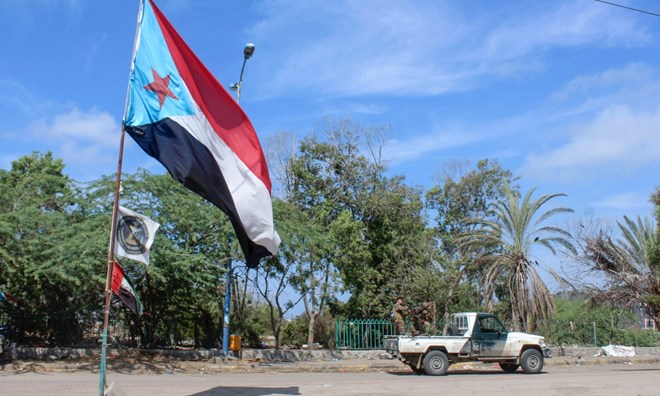
Tuesday April 28, 2020
Southern Transitional Council breaks with wartorn state’s internationally recognised government

Fighters with Yemen’s separatist Southern Transitional Council drive past a separatist flag as they deploy in the southern city of Aden. Photograph: Saleh Al-Obeidi/AFP via Getty Images
The Saudi Arabian-backed government in Yemen has warned of a catastrophe if the country’s powerful separatist movement forges ahead with its declaration of self-rule over the key port city of Aden and other southern provinces.
The Southern Transitional Council’s armed forces were deploying on Sunday in Aden, the interim seat of the internationally recognised government backed by the Saudi-led military coalition that had until now included the STC.
The United Arab Emirates, unlike Saudi Arabia, has backed the STC, so the move has the potential to create tensions between two close Gulf allies against one another, complicate the task of securing a national agreement to end to the five-year civil war, and possibly restore the geographical division that existed in the former British colony before unification of Yemen in 1990.
The STC said it had acted because the Riyadh agreement, a deal between the STC and the UN backed government of Yemen brokered by Saudi Arabia last November, was not bring implemented.
In an effort to stem the scale of the southern rebellion, the foreign minister of the UN-recognised Yemen government, Mohammed al-Hadrami, condemned the STC’s move as “a resumption of its armed insurgency … and an announcement of its rejection and complete withdrawal from the Riyadh agreement”.
He called for Saudi Arabia to take “decisive measures against the continuing rebellion of the so-called Transitional Council”.
Hadrami claimed the governors of Shabwa, Socotra, Mahrah and Hadramout had all rejected the STC declaration. However, in Aden on Sunday the STC seized all the major institutions including the port.
Saudi Arabia described the STC move as escalatory, and the UAE foreign minister Anwar Gargash insisted “frustration with the delay in implementing the Riyadh agreement should not be a reason to change the situation unilaterally”.
The UN special envoy for Yemen Martin Griffiths said he found the STC move concerning. “Now, more than ever, all political actors must cooperate in good faith, refrain from taking escalatory actions, and put the interests of Yemenis first,” he stressed.
The STC’s move, if it takes root, will complicate international efforts to start reconciliation talks as well as any coordinated effort to stave off an outbreak of coronavirus.
The separatist movement has been pressing for years for greater autonomy and recognition in any national peace talks. Last year the STC rebelled against the UN-recognised government and seized Aden, and violence spilled over into territory to the west of the city.
Saudi Arabia brokered a deal between the two sides on 5 November to form a more inclusive government and place all forces under state control, but the agreement, involving a withdrawal of forces, has hardly been implemented.
For five years Riyadh has been using its air power in an attempt to reinstate the Hadi government to power across the country by defeating an Iranian-supported Houthi rebellion.
But in recent months Riyadh, faced by the division within the ranks of the forces it backs in Yemen and its own inability to win militarily, has been sending signals that it wants to end the war if the Houthis will compromise.
On Friday Saudi Arabia announced it was extending its two-week-old, thinly observed unilateral ceasefire by a four weeks, in a move welcomed by the UK and the UN special envoy Martin Griffiths.
Griffiths says he has been trying to convene virtual talks to forge “a permanent comprehensive and mutually agreed ceasefire”, but says this requires the cooperation of all sides.
The STC, which has said it wants to be included in any political negotiations, pulled out of committees implementing the Riyadh deal in January. The STC says the Hadi government is gripped by corruption and continually refuses to pay salaries of public-sector staff.
The UAE, which like STC opposes the Islamist Islah party that forms part of Hadi’s government in the south, has withdrawn its forces from Yemen over the past 12 months but retains ambitions to control commercial ports across the south. The UAE regards the Islah party as a branch of the Muslim Brotherhood, which it opposes across the Middle East.